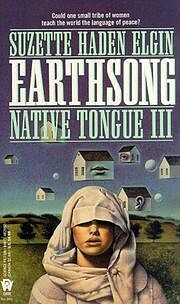

Cliquer sur une vignette pour aller sur Google Books.
|
Chargement... Earthsong (Native Tongue) (original 1993; édition 1994)par Suzette Haden Elgin
Information sur l'oeuvreEarthsong par Suzette Haden Elgin (1993)
 Actuellement, il n'y a pas de discussions au sujet de ce livre. The third in the "Native Tongue" trilogy by Suzette Elgin, and the weakest of the lot. The first book is in my view a terrific novel, chockfull of fascinating ideas and with a compelling plot that makes the book's greatest weakness (a political agenda that to my mind weakens characterization) a minor quibble. The second book is a good sequel to the first, developing aome of the ideas introduced earlier, but the "good women/bad men" gets more grating. The last book is difficult to follow (or was for me) and didn't hold my interest. I finished it out of loyalty, but next time I will just reread "Native Tongue" This follow-up to the first two Native Tongue books was disappointing. I really enjoyed the sub-story about Delina Chornyak, but some of the other themes and writing were simply not enjoyable to me. A philosophical theme of "true change takes a long time" that lies within the book is a good one, but completely obscured by other things... The problems lie in these critical areas: * The writing is too convoluted...the changing viewpoints severely detract from the reading going smoothly, requiring some backtracking to get the idea of what is going on. * The characterization of both men and women in this book seem...unbelievable. * Part of the "solution" seems to be "technology so different, its indistinguishable from magic". In this book in particular, its hard to swallow as a scientific solution. Elgin isn't in alone in this regard however, There seems to be trend in SF sequels to go this route...solving the problems set up by previous books a science so beyond us, its pretty much magic. A trend that tends to disappoint me when I reach that point in a series. * An idea that is popular, that the first two books included subtly, is in the fore-front of this book: "Women are less mean than men". Its in idea that I fully disagree with...I've experienced just as much hatefulness from women as men; and I found the theme being presented in the book simply annoying. aucune critique | ajouter une critique
Est contenu dansPrix et récompenses
An instant cult classic upon first publication, Suzette Haden Elgin'sNative Tongue trilogy has earned wide critical acclaim, shocking and captivating a loyal readership among science fiction and women's literature audiences alike. InEarthsong, the trilogy's long-awaited finale, the interplanetary Consortium has decided to abandon the incorrigibly violent Earth to economic and ecological disaster. As the Consortium prepares to euthanize the diseased planet, the women of the Lines are offered one last chance to change the men's destructive behavior and cancel the planet's annihilation. Aucune description trouvée dans une bibliothèque |
Discussion en coursAucunCouvertures populaires
 Google Books — Chargement... Google Books — Chargement...GenresClassification décimale de Melvil (CDD)813.54Literature English (North America) American fiction 20th Century 1945-1999Classification de la Bibliothèque du CongrèsÉvaluationMoyenne: (3.31) (3.31)
Est-ce vous ?Devenez un(e) auteur LibraryThing. |
||||||||||||||||||||||||||||||||||||||||||||||||||||||||||||||||||||||||||||||||||||||||||||||||||||||||||||||||||||||||||||||||||||||
By this third book, they've given up. Laadan came, it went, it was a failure. I can't help but feel that the novel echoes Elgin's own experiences with Laadan, and the whole thing comes off with a bit of a bitter note.
Now earth faces a new challenge: all the aliens have disappeared, and with them their trade. The technology humanity has come to rely on is starting to crumble, and civilization is in chaos.
It's been several weeks since I read this and by this point I can't actually recall what it was that I enjoyed somewhat here. The plot is thin, the characters weak, and the 'science' that goes with the fiction is so laughable that it's hard to even take it seriously as a thought experiment.
Nazareth is dead, and one of her granddaughters uses mystical Native American rituals to communicate with her about a life-altering problem: all the aliens have left. More importantly, earth can no longer trade for their technology. Nazareth tells her granddaughter that in order to solve the problem, humanity must conquer hunger, and so the women take up a new project.
*SPOILERS*
Eventually they discover that /sound/, when paid proper attention, can nourish the human body. Yeah, you read that right. We don't really need food. We just need to listen to some opera. Elgin goes so far as to suggest that the obesity epidemic at the end of the 20th century was related to the sudden abundant availability of portable music.
The problems in this idea are so numerous I trust I do not even have to begin to explain them. I'm willing to forgive a lot for an interesting idea - and Elgin /tries/ to make the idea interesting. The point of music-as-food is that creating a generation which has never had to kill so much as a vegetable to survive will be less violent in the end (violence being the reason the aliens had pulled away from earth), which is an interesting concept but-- it's simply too much, too poorly drawn and too poorly explained.
I suppose I'm glad I finished this trilogy but-- for the rest of you, stick with the first and leave the rest alone. (